 Petzlover
Petzlover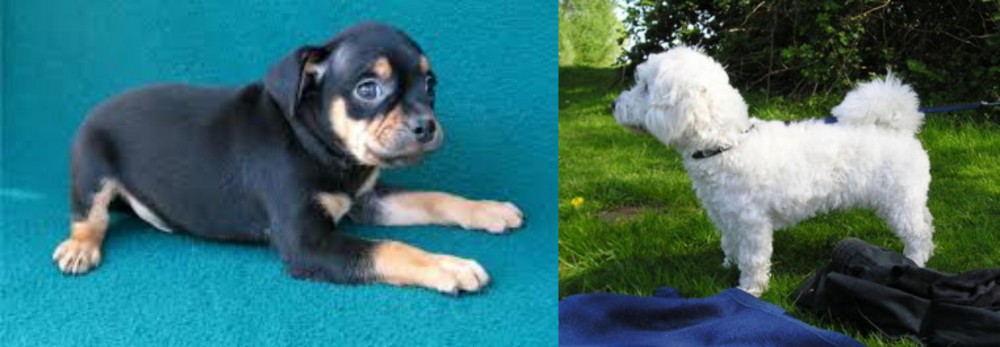 Both Carlin Pinscher and Franzuskaya Bolonka are originated from France. Carlin Pinscher may grow 6 cm / 3 inches higher than Franzuskaya Bolonka. Both Carlin Pinscher and Franzuskaya Bolonka are having almost same weight. Both Carlin Pinscher and Franzuskaya Bolonka has almost same life span. Carlin Pinscher may have more litter size than Franzuskaya Bolonka. Both Carlin Pinscher and Franzuskaya Bolonka requires Low Maintenance.
Both Carlin Pinscher and Franzuskaya Bolonka are originated from France. Carlin Pinscher may grow 6 cm / 3 inches higher than Franzuskaya Bolonka. Both Carlin Pinscher and Franzuskaya Bolonka are having almost same weight. Both Carlin Pinscher and Franzuskaya Bolonka has almost same life span. Carlin Pinscher may have more litter size than Franzuskaya Bolonka. Both Carlin Pinscher and Franzuskaya Bolonka requires Low Maintenance.
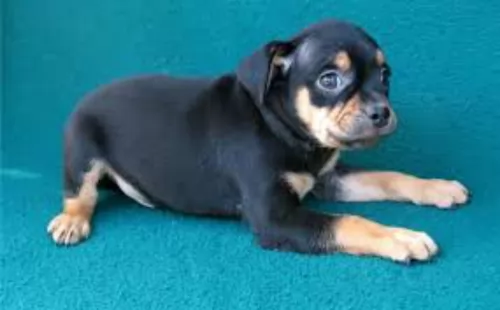 There are conflicting views as to where the Carlin Pinscher hails from, with some reports saying France and others the USA. The names of some breeders suggest it could be France.
There are conflicting views as to where the Carlin Pinscher hails from, with some reports saying France and others the USA. The names of some breeders suggest it could be France.
The dog hasn’t got a long history, being developed only in the early 1900s. Two breeders, Morgan and Buenafe left their Miniature Pinscher with a Pug owner for a while and on return discovered that the dogs had mated, producing puppies which looked like miniature Rottweilers.
It was in 1998 that a breeding program began and a Boxer was also brought into the mix to improve the characteristics of the dog. The dog is still being developed and isn’t recognized by the major kennel clubs.
 The Franzuskaya Bolonka in France is known as the Tsvetnaya Bolonka in Russia and in Germany as the Bolonka Zwetna. All of these translate to Colored Bolognese. It is known as the “Pride of Russia” and was rediscovered by the Russians following the thaw of the Cold War. It is also sometimes translated as a colored lapdog.
The Franzuskaya Bolonka in France is known as the Tsvetnaya Bolonka in Russia and in Germany as the Bolonka Zwetna. All of these translate to Colored Bolognese. It is known as the “Pride of Russia” and was rediscovered by the Russians following the thaw of the Cold War. It is also sometimes translated as a colored lapdog.
The Bolonka is a rare breed in the toy category with ancestors in the Bichon Friese line. This little dog looks very much like the national dog of Cuba – the Havanese. In addition to the Bichon other small dogs in this ancestral line include the Shih Tzu, Toy Poodle, and Pekingese as well as the French, Italian and German Bolonka. They are often confused with the Bolognese as both breeds appear in various countries and have many similarities.
In all countries the common name for this dog is the Bolonka. They have a variety of names and nick names depending on the country. In addition to being the “Pride of Russia” he is called a Russian colored Bichon, Czechs call it the Bareyny Bolonsky, the Germans since 1980 have called it the Bolonka Zwetna but the Nordic Kennel Union does not recognize the Zwenta only the Russian Twetnaya.
The French version is seen to be the original with its ancestry dating back to the 18th century when Russian nobles were presented with a Bolonka by Louis XIV of France, and others migrated with the army of Napoleon to Russia. They were still known as the Bolonka of France. Small dogs were not popular in Russia due to the need for dogs that could work on farms and/or hunt. Particularly during the Soviet years, they were considered unnecessary. No Bolonkas were imported to Russia during the Soviet regime, so only localized breeding took place. The goal of breeders in the Soviet Union was to develop a toy dog, lap sized with an apartment living temperament.
During the cold war the Russians sent a pair of breeding Franzuskaya Bolonka to East Germany and they began to develop the breed there as well. At the same time the colored versions of the Bolonka were being bred. The Franzuskaya Bolonka is recognized by the Verband Dur Das Deutsche Hundewesen (VDF) while the other colored breeds are not. The white Bolonka is not recognized by the Federation Cynoloqique Internationale as a breed separate from the Bolognese but as simply another version. Individual clubs throughout the world recognized one or more versions of the Bolonka. They are thought to be the rarest within the Bichon family.
Today’s Bolonka is owed by Prince William and Princess Kate, giving the breed more publicity than it has had in many years.
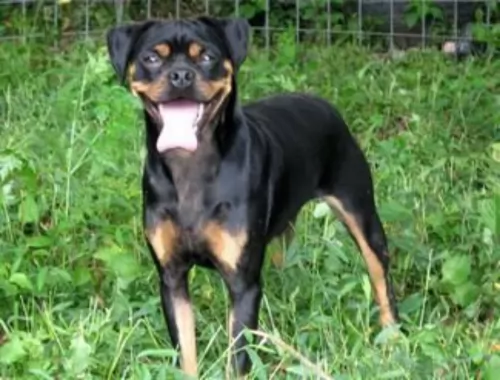 The Carlin Pinscher has been developed to be a social and loving companion. Started as a cross between a Miniature Pinscher and Pug, other breeds have also been brought in. He still has varied appearances, often looking like a tiny Rottweiler but also looking like anything between the Miniature Pinscher or the Pug.
The Carlin Pinscher has been developed to be a social and loving companion. Started as a cross between a Miniature Pinscher and Pug, other breeds have also been brought in. He still has varied appearances, often looking like a tiny Rottweiler but also looking like anything between the Miniature Pinscher or the Pug.
This is a small sized dog standing at anything from 27- to 33 cm and weighing 5 or 6kg. The body is compact with sturdy legs coming from the Pug side. The skull is a dome shape, the ears can be erect or floppy and unless the tail is docked it can be long, curling somewhat over the back. The coat is short and smooth and comes in shades of tan, brown and black.
The Carlin Pinscher is small but with a strong personality, being gentle and sweet in nature. He promises to be a loyal and affectionate companion for his human family, loving to be involved in all their activities.
He is an energetic, playful little dog and also intelligent, so apart from a walk and ball games, he’ll need some toys for indoors too that can provide physical- and mental stimulation. With early training and socialization, the Carlin Pinscher is a good friend of children and he will get on well with other pets in the house too. He is a small dog so children should be supervised and taught to handle him with gentleness and kindness.
 The Franzuskaya Bolonka is neither heavy boned nor fine boned. They are a toy breed with a moderate bone structure. The ears are neither long nor short and they have tails that touch the back at the tip. Like others in the Bichon family the Franzuskaya Bolonka does not shed. He is a sturdy little dog and the male has a distinct beard and moustache that the females of the breed do not. They have long coats that are wavy and curly. The Franzuskaya Bolonka is of course only white. The Russian version might be brown, red, black, wolf-gray, gray and of course white.
The Franzuskaya Bolonka is neither heavy boned nor fine boned. They are a toy breed with a moderate bone structure. The ears are neither long nor short and they have tails that touch the back at the tip. Like others in the Bichon family the Franzuskaya Bolonka does not shed. He is a sturdy little dog and the male has a distinct beard and moustache that the females of the breed do not. They have long coats that are wavy and curly. The Franzuskaya Bolonka is of course only white. The Russian version might be brown, red, black, wolf-gray, gray and of course white.
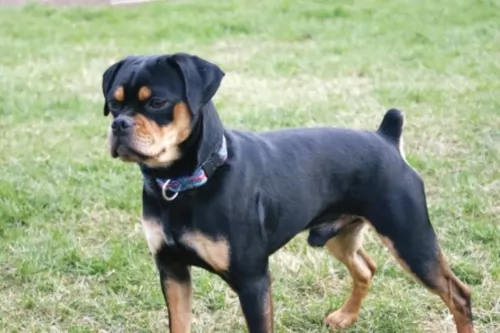 The Carlin Pinscher makes an ideal little pet and he will be content to live in a small home in the city or in the country, just so long as he is with an owner who loves and cares for him. They are balanced, easy-to-get-along-with dogs, being even-tempered, playful and outgoing.
The Carlin Pinscher makes an ideal little pet and he will be content to live in a small home in the city or in the country, just so long as he is with an owner who loves and cares for him. They are balanced, easy-to-get-along-with dogs, being even-tempered, playful and outgoing.
He is active, intelligent, strong-willed, stubborn and brave. It is true that people who have kept mixed-breed dogs rave about them. Certainly mixed breed dogs have earned themselves a reputation for being superb family pets. They’re healthy, feisty, quaint and entertaining.
These days many mixed breeds are no longer pavement specials but part of careful breeding, such as with the Carlin Pinscher. He is full of personality and makes a great family pet, getting along with other animals and also being good around children.
 The Bolonka is great with kids, just avoid too intense play.
The Bolonka is great with kids, just avoid too intense play.
The Bolonka is a playful, lap dog with a lot of love to offer
Good adaptability great in the city in apartments and great in the country as well
They are very smart and love to learn. Being firm but beyond firm is also kind.
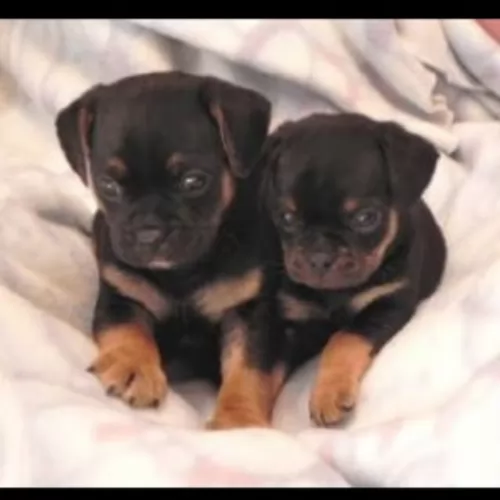 The Carlin Pinscher is a feisty little dog who can live to be up to 13, 14 or 15 years of age. He is a fairly healthy breed too, but there will always be some issues that the Carlin Pinscher might be prone to. Typical dog ailments include eye problems, hip dysplasia, liver problems, skin- and dental problems.
The Carlin Pinscher is a feisty little dog who can live to be up to 13, 14 or 15 years of age. He is a fairly healthy breed too, but there will always be some issues that the Carlin Pinscher might be prone to. Typical dog ailments include eye problems, hip dysplasia, liver problems, skin- and dental problems.
All liver problems with a dog are serious and will need veterinary intervention. A noticeable symptom of liver disease is jaundiced yellowing of the white of the eye. You might even see a yellowing on the underside of the ear flap. Your pet will have loss of appetite, constipation as well as highly colored urine.
 Medical issues are not fully documented because of the rarity of the breed and the years of isolation in the Soviet Union.
Medical issues are not fully documented because of the rarity of the breed and the years of isolation in the Soviet Union.
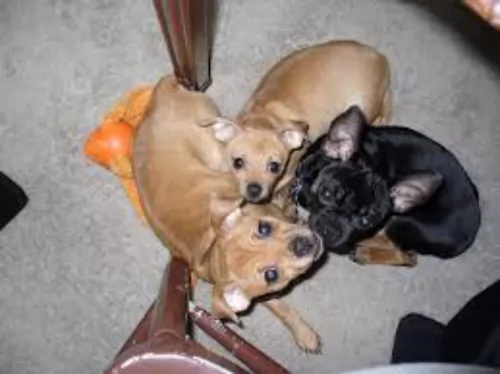 With his short, smooth coat, the Carlin Pinscher is a low to moderate shedder who is easy to maintain. The short coat will simply need a brush-down twice a week to rid him of loose hairs. If he is dusty, you can wipe the coat down with a warm, damp cloth.
With his short, smooth coat, the Carlin Pinscher is a low to moderate shedder who is easy to maintain. The short coat will simply need a brush-down twice a week to rid him of loose hairs. If he is dusty, you can wipe the coat down with a warm, damp cloth.
Every dog, large or small needs a balanced diet that consists of proteins, fats, vitamins, minerals and carbohydrates. A well balanced diet keeps a dog healthy but also in shape. A dog requires certain ingredients in its diet, depending on age, activity levels, size and stage of life such as pregnancy or illness.
For starters, dogs need fresh, cool water at all times. If you’re confused about dry kibble or semi-moist dog food for instance, speak to your vet about what your Carlin Pinscher needs. It’s always good to give your pet variety, so mixing in some rice, vegetables and meat will be wonderful for your pet as will some raw meat from time to time.
 Feed at least 3 meals a day. Feed one fourth of a cup daily split into three meals of a high quality puppy food.
Feed at least 3 meals a day. Feed one fourth of a cup daily split into three meals of a high quality puppy food.
Feed at least 2 meals per day. Feed one half of a cup daily split into two meals of a high quality dry food.
Fairly healthy breed due to isolation during cold war
The Franzuskaya Bolonka is developed as a lap dog but that does not mean he doesn’t need daily exercise. He loves to play but play gently and not for any length of time. They like to chase balls, play hide and seek and any tricks you want to teach them.